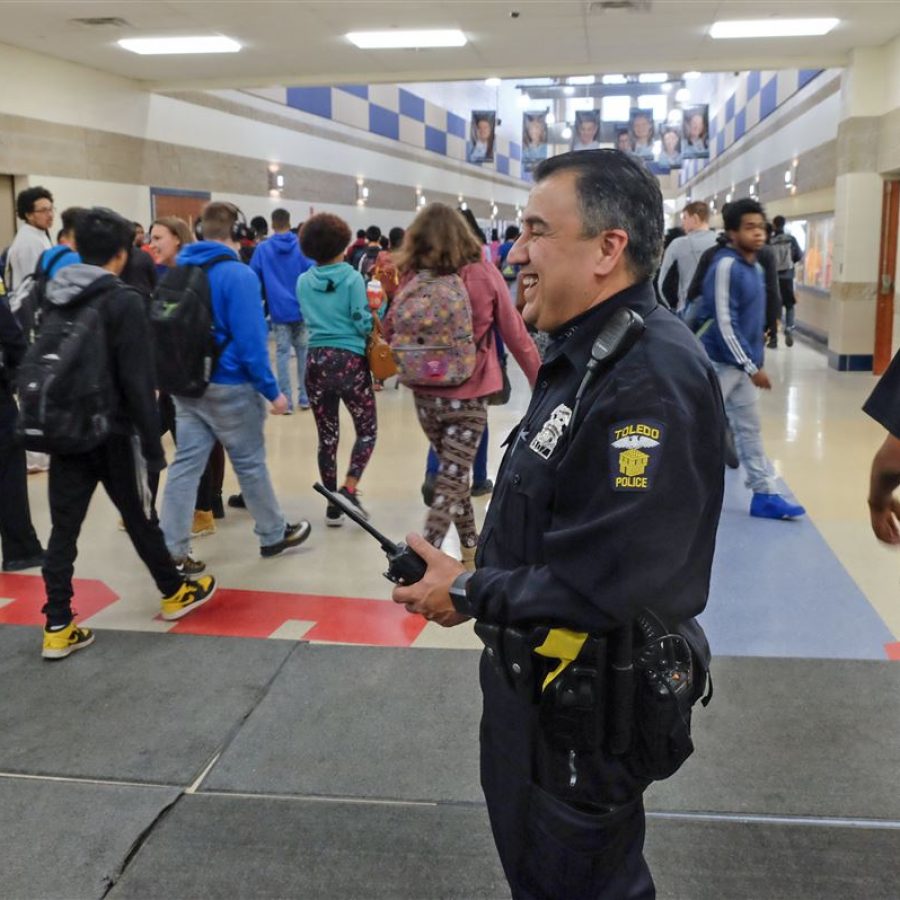by Kevin Lewis, Montgomery County Reporter
MONTGOMERY COUNTY, Md. (ABC7) — The Montgomery County Council’s Public Safety Committee voted 2-0 last week to remove a requirement that would have authorized the expansion of the school resource officer (SRO) program.
Currently, one SRO is assigned to every public high school in Montgomery County. That officer is often responsible for responding to incidents at middle and elementary schools within their respective cluster.
The original language in Bill 33-19 — more commonly known as the Community Policing Bill — allowed for the expansion and maintenance of the school resource officer program. The bill did not specify how many additional SROs would be hired nor did it state if those officers would be new hires or simply re-assigned from other existing units with the police department.
In recent months, several community groups and residents contacted the council, and the bill’s co-lead sponsors — Councilmember Nancy Navarro (D-District 4) and Councilmember Craig Rice (D-District 2) — to express their disdain with the idea of growing the number of SROs.
CIVIC GROUPS SHARE THEIR OPPOSITION
“Nationally, the student arrest rate was about 140 per I0,000 enrolled students, but in Maryland, the rate was 217 per 10,000, and in Montgomery County, the rate was a whopping 322 per 10,000 well over double the national rate.” — The Montgomery County Chapter of the ACLU Maryland
“Jewish tradition teaches us that destroying one life is akin to destroying the entire world, and increased police presence in our schools has the potential to destroy the worlds of many children of color in the County.” — Jews United for Justice
“For some parents, the presence of SROs in schools alleviates their concerns about school safety. Those parents will point to the brave actions of an SRO to stop a school shooter in Great Mills, Md. However, for many other parents, the presence of an SRO undermines the academic environment and permits the escalation of routine administrative discipline.” — Montgomery County Branch of the NAACP
“A police officer’s regular presence at a school is predictive of greater odds that school officials refer students to law enforcement for committing various offenses, including these lower-level offenses… The consequences of involving students in the criminal justice system are severe, especially for students of color, and may negatively affect the trajectory of students’ lives.” — Takoma Park Mobilization
RESIDENTS SHARE THEIR OPPOSITION
“Putting more police in schools increases the risk of abuse and criminalization for our children, especially Black, Latinx, and Indigenous youth. Instead, the county should fund counselors and mobile mental health crisis units.” — Helen Avner, North Potomac resident
“Why bring more police into public schools? Instead, why not bring in more counselors and nurses? As for nurses, the National Association of School Nurses recommends a ratio of one nurse to 750 students. But Montgomery County has a ratio of one nurse to 1,600 students.” — Carol Ehrlich, Montgomery County resident
“If we add more police officers to schools, you will quickly see more black and brown young people being arrested and engaging with the criminal justice system. That’s exactly what we don’t need in Montgomery County! If we are going to spend more money, it should be on school counselors, nurses or MORE AFTER SCHOOL PROGRAMS.” — Tim Ernst, Silver Spring resident
“Both my children have diagnoses related to emotional regulation and social awareness. Both of them can behave inappropriately. Teachers like me have extensive training in child development and strategies to deal with behavior challenges and special needs students. Counselors have even more training in providing emotional support for children and teens. Police officers simple [sic] do not receive the same training and armed officers are not the people who should be responding to children having a hard time.” — Kay Henry, Burtonsville resident
“My family and I don’t feel safe with more police. Instead, we are urging MCPS to decrease and eventually eliminate the regular presence of police in our schools indefinitely and replace cops with culturally compotent [sic] counselors and social workers. If you want to invest money into safety in our schools, use these funds to help MCPS fully fund restorative justice coordinators, and peacebuilders, not for more cops.” — Hashim Jabar, Silver Spring resident
“If you tell me, ‘we need SROS to protect our schools if there is an active shooter,’ I’ll tell you the story of Parkland, Virginia Tech, and Columbine, all of which had armed law enforcement present when mass shootings destroyed the sanctity of these institutions of learning.” — Tiffany Kelly, Montgomery County resident
COUNCILMEMBERS WALK THE LINE
During a February 13, work session on the Community Policing Bill, Councilmember Albornoz stated that he understood certain residents’ concerns about the addition of school resource officers. Yet, Albornoz said his personal experience with the SRO program has only been positive. Albornoz, a Montgomery County native, previously worked as the director of the recreation department. In that role, he oversaw many after-school programs and often crossed paths with SROs.
“The school resource officers that we regularly interacted with through Montgomery County recreation — and the various schools that we worked with — were not just beat officers taken off the street and assigned to a school. These were folks that had received an extensive amount of training in how to de-escalate situations,” Albornoz remarked. “They did provide another caring adult that students could turn to in incidents where they felt they were being threatened by violence, in incidents where they felt like sex trafficking had been identified… and they also provided support for the administration as a whole.”
Councilmember Craig Rice (D-District 2) made his passion and support for the SRO program abundantly clear, noting that many SRO opponents in the audience were conflating national stories of SRO mishaps with Montgomery County.
“Folks continue to espouse things about our school resource officers that aren’t true, and they don’t have any data to back it up. Anyone who says that school resource officers lock up kids or they abuse kids, don’t have any data to support that, and I would challenge you to provide that to me. It’s councilmember.rice@montgomerycountymd.gov [or] 240-777-7955. Please contact my office if you have evidence to support that, and if you don’t, please stop saying that.”
Rice went on to share that his cousin, an officer in Prince George’s County, was recently injured on the job. He further encouraged SRO skeptics to watch an online “day in the life” video that features a Montgomery County SRO.
“I’ve asked many people who are in the audience to come with me to a school, to sit with a school resource officer, to see how the children interact. My phone has not rung yet. So, I issue the challenge again. Come with me if you think that our school resource officers are so bad and let’s see what the students have to say, the real consumers of our school resource officer program. And then let’s see if you’ll hold up the same signs and send the same notes to the council.”
Council President Katz kept his comments relatively brief and even-keeled during the February 13, work session, but noted that although everyone is not “perfect every day,” Montgomery County is on the “cutting edge” of police work.
“In many cases, a school resource officer is a counselor to a student, he’s a friend to a student, he’s a sponsor — or she’s a sponsor — for after-school clubs. Our school resource officers do a very good job,” Katz remarked.
THE FOP FIRES BACK
FOP Lodge 35 called the notion that SROs cause more harm than good, “absurd.” In a pointed written statement, FOP Lodge 35 Vice President Lee Holland noted there are “countless examples” of SROs confiscating guns and drugs, preventing sexual assaults and discovering sexual predators within the public school system.
“The hate which certain groups have for police officers and the anti-police sentiment must stop. It seems these groups would rather create a chasm between the community and its police rather than seek to develop a bond. The community and the police need each other, and until these advocacy groups recognize that, there will be no growth,” Holland stated.
In recent years, 7 On Your Side has reported on SROs seizing a loaded handgun at Clarksburg High School, investigating the locker room rapes at Damascus High School and breaking up physical fights within high schools across the county.
“The women and men who work as SROs are highly trained, extremely competent, and are a great example for other SRO programs around the State of Maryland. Without the dedication of our members who work as SROs, there is no doubt that Montgomery County Public Schools would not be as safe of an environment as it is for our children,” Holland added.
MOVING FORWARD
Despite their words of support, Council President Sidney Katz (D-District 3) and Councilmember Gabe Albornoz (D-At Large) voted 2-0 last week to remove language from the Community Policing Bill that would have allowed the police department to expand and maintain the SRO program.
Councilmember Tom Hucker (D-District 5) — who is the third member of the Public Safety Committee — was not in attendance for the vote as he was testifying in Annapolis on a bill regarding the I-495, I-270 public-private partnership. Hucker, a major opponent of Beltway widening, explained that his testimony provided many constituents with a much-needed voice.
The nine-member council is scheduled to vote on the full, Community Policing Bill on Tuesday, March 3, around 10:15 a.m.






